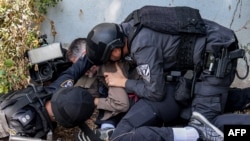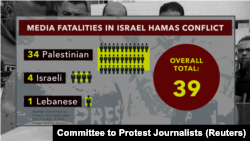News outlets and press freedom groups are rejecting as false and dangerous a report by an Israel-based organization that questioned whether some freelance photojournalists had prior knowledge of the October 7 Hamas attack on Israel.
HonestReporting, a charity that monitors media coverage for perceived bias against Israel, released a report Wednesday that questioned whether several Gaza-based freelance photojournalists knew about the attack in advance and suggested that some took part.
It shared social media pictures that appear to show one of the journalists standing next to a tank, and an undated picture of the same journalist standing, smiling, alongside a Hamas leader who Israel says masterminded the October 7 attack.
Among the photojournalists the website named were some who contribute to The Associated Press, Reuters and The New York Times.
News outlets and press freedom groups rejected the report, but the claims circulated quickly on social media — including from Israeli politicians and officials — in a phenomenon that some news outlets and press freedom groups say puts journalists covering the Israel-Hamas war at greater risk.
The AP, Reuters and The New York Times all denied in statements that they had any advance knowledge of the Hamas attack.
'There is no evidence'
The photojournalists named in the report included Hassan Eslaiah, Yousef Masoud, Ali Mahmud and Hatem Ali, who were working for AP that day.
Eslaiah has also worked for CNN in the past, and Masoud has also worked for The New York Times.
Mohammed Fayq Abu Mostafa and Yasser Qudih, who freelance for Reuters, were also named.
The photographs published by Reuters were taken two hours after Hamas fired rockets across southern Israel and more than 45 minutes after Israel announced that gunmen had crossed the border, the news agency said in a statement.
Meanwhile, AP said in a statement that the first pictures the news outlet received from any freelancer showed that they were taken more than an hour after the attacks began.
The agency said, without explanation, that it was no longer working with Eslaiah, who was shown in an undated photo reproduced by HonestReporting being kissed on the cheek by Hamas' Gaza leader Yahya Sinwar.
In its statement, The New York Times said, "HonestReporting has made vague allegations about several freelance photojournalists working in Gaza, including Yousef Masoud."
Masoud was not working for the Times on the day of the attack, but the newspaper said, "He has since done important work for us."
"There is no evidence for HonestReporting's insinuations," the Times said, adding, "Our review of his work shows that he [Masoud] was doing what photojournalists always do during major news events, documenting the tragedy as it unfolded."
The HonestReporting article received thousands of views and retweets on X.
And the Israeli prime minister's office issued a statement saying, "These journalists were accomplices in crimes against humanity; their actions were contrary to professional ethics."
Charity says journalists 'joined' criminal act
In an interview with VOA, Simon Plosker, HonestReporting's editorial director, defended the report.
He said he recognized that the photojournalists might have just been doing their jobs to document what was happening, "except for the fact that they basically joined in a criminal act."
Plosker said he thought it was a criminal act for journalists to cross the border to cover the Hamas attack.
When pressed on the apparent lack of evidence to substantiate the claims, Plosker said, "That's exactly why we raised various questions here, because we are seeking answers ourselves."
The editorial director said HonestReporting spent a day working on the piece and had not attempted to contact any of the photojournalists it named for comment.
Report could discredit journalists, say experts
The far reach of unsubstantiated claims concerned media advocates who warned it could be used to discredit journalists.
"This one is particularly incendiary, especially because they seem to have put so little effort into proving it right," Kelly McBride, senior vice president at the Poynter Institute, told VOA.
While Plosker characterized the photojournalists crossing the border as taking part in the incursion, news outlets and analysts said the reporters were just doing their jobs.
"Journalists did what journalists do. They went to the story," Nour Odeh, a Palestinian political analyst, told VOA from Ramallah.
The Times, in its statement, said it's the job of photojournalists "to rush into danger to provide firsthand witness accounts and to document important news."
"This is the essential role of a free press in wartime," the statement added.
The Committee to Protect Journalists, or CPJ, said it's concerned that such accusations make it riskier for journalists to cover the war, which has already seen the deaths of at least 39 journalists, including 34 Palestinians, 4 Israelis and 1 Lebanese.
"Attempts to smear, delegitimize and criminalize journalists who are doing their job are outrageous and irresponsible, and they put journalists at further risk. Targeting journalists with disinformation only endangers them," Gypsy Guillen Kaiser, CPJ's advocacy and communications director, told VOA in a statement.
Odeh said the number of Palestinian journalists who have been killed still hadn't set in.
"There's going to be a hole in the community," said Odeh, a former West Bank correspondent for Al Jazeera, who several years ago briefly worked in diplomacy and communications in the West Bank.
In its statement refuting the report, the Times said it had concerns that "unsupported accusations and threats to freelancers endangers them and undermines work that serves the public interest."
In addition to the Israeli prime minister's office's response to the HonestReporting claims, Danny Danon, a member of Israel's parliament, the Knesset, and the former Israeli permanent representative to the United Nations, appeared to call for the journalists to be killed.
"Israel's internal security agency announced that they will eliminate all participants of the October 7 massacre. The 'photojournalists' who took part in recording the assault will be added to that list," Danon said in a post on X.
CPJ president Jodie Ginsberg told VOA earlier that this has been the deadliest conflict for journalists that it has ever documented.
She added that journalists are civilians, not targets.
"We rely on journalists to be our eyes and ears in a conflict so that we know, as the international community, what is happening," she said. "International crews aren't able to get into Gaza. We are entirely reliant on Palestinian journalists, local journalists reporting."





